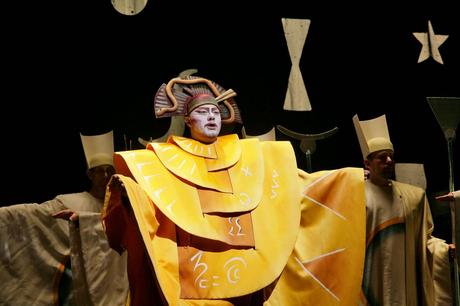by Paul J. Pelkonen

Here comes the sun king: René Pape as Sarastro in Die Zauberflöte.
Photo by Ken Howard © 2014 The Metropolitan Opera.
This year, the Met takes mercy on its audience by presenting (for the first time in five years), the full two-act opera in its original German text. This revival also features director Julie Taymor's imaginative production, incorporating Balinese shadow puppetry, dancing bears and a set of visuals that balances neatly between comic whimsy and the Masonic mysticism that is at the core of this very unusual opera.
Written for the popular Viennese theater operated by Mozart's friend and fellow Mason Emmanuel Schikenader (the creator of the key role of Papageno), Zauberflöte was an immediate popular success. The two-act opera tells the story of a young prince's quest to rescue the fair Pamina from the clutches of an evil wizard, and the quest that follows when the young man learns that not everything is as it seems.
This revival features the return of South African soprano Pretty Yende as Pamina, tenor Toby Spence as Tamino and baritone Markus Werba as the feathered bird-catcher Papageno--the "everyman" who provides much of the opera's comic relief. The forces of light and darkness are represented by bass René Pape (as Sarastro) and Ana Durlovski as the Queen of the Night. Adam Fischer conducts.
Die Zauberflöte opens Oct. 6.
Recording Recommendations:
The Magic Flute is one of the most popular operas ever written, and there are many recordings available. The best combine a great conductor's reverence for the music with a superb and idiomatic German-speaking cast. Here are two that came out in 1964. Four decades after their release, they continue to stand out. (And yes, the're both in German because this opera is better in German.
Philharmonia Orchestra cond. Otto Klemperer (EMI, 1964)
Tamino: Nicolai Gedda
Pamina: Gundula Janowitz
Papageno: Walter Berry
Queen of the Night: Lucia Poppp
Sarastro: Gottlob Frick
Otto Klemperer's heavyweight approach to Mozart sometimes makes the music sound more like Beethoven, but that's not necessarily a bad thing in this opera. This EMI recording is in German but omits the spoken dialog between numbers. This artificial approach lets the listener focus on the ebb and flow of Mozart's music. The cast is industry standard, with a good mix of older and younger singers. Gundula Janowitz and Lucia Popp are standouts. This set is also available as part of a bargain box of Otto Klemperer's Mozart opera recordings which came out earlier this year.
Berlin Philharmonic cond. Karl Böhm (Deutsche Grammophon, 1964)
Tamino: Fritz Wunderlich
Pamina: Evelyn Lear
Papageno: Dietrich Fischer-Dieskau
Queen of the Night: Roberta Peters
Sarastro: Franz Crass
Another set from an expert Mozart conductor who is a bit more brisk in his approach to the score. The Böhm recording incorporates some of the original spoken dialogue, making the experience more like the opera is in the theater. He has a crackerjack cast (almost as good as the Klemperer set) with Dietrich Fischer-Dieskau's Papageno and Fritz Wunderlich's Tamino dominating the set. (The "Die Bildnis" in Act I is to die for.) The late Evelyn Lear is a lovely Pamina and Franz Crass (the Speaker on the Klemperer set) is a firm, dark Sarastro.
Tickets for Die Zauberflöte are available at MetOperaFamily.Org, by calling (212) 362-6000, or at the box office.

